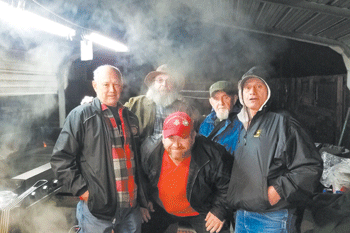Members of local Veterans of Foreign Wars posts work to help veterans and the local community members alike.
“We do things to help out our local veterans, point them in the right direction, if they need to understand their medical benefits or their disability, we have a lobbyist group in D.C. for them,” said Jim Blevins, commander of VFW Post 10630 in
Hope Mills.
The VFW acts as a middleman to educate veterans on their benefits, rights and connect them to the proper resources. VFW posts have a service officer that helps with claims, answers questions, helps complete paperwork. The service officer is available to help if veterans need it said Mike Baker, commander of VFW Post 670 in Fayetteville.
“We have the need fund to pay bills in case of emergencies, cars broke down, you need gas, etc., they can call the local VFW’s, submit a form and we are able to assist them with small cash payments,” Baker said.
Post 670 raises money through golf tournaments and other events throughout the year and donates some of it to homeless veterans to meet their food and clothing needs, and connect them with other resources.
Blevins said the group tries to protect veterans’ rights as well as help them in times of need. He said the post received brand new electric wheelchairs, which cost about $6,000, which will be donated to a veteran in need, who otherwise couldn’t afford it.
“In conjunction with the Veterans Affairs committee in Hope Mills, we do outreach programs, we invite the VA, Red Cross, Disabled Veterans Administration, Tricare and set up a table for veterans who aren’t sure what they’re benefits are, just to get information,” Blevins said. “It gives them an opportunity to come in and learn more about their benefits and help point them in the right direction.”
VFW also gives back to the community by offering scholarships to students locally. The Voices of Democracy and Patriot's Pen programs allow students to write essays and win scholarships towards the school of their choice.
“The Voice of Democracy is a $30,000 scholarship, Patriots Pen is a $5,000 scholarship to the school of your choice,” Baker said. “So that’s a way for us to give back to the community, the post gives some, the district gives some, then national gives some.”
Another thing that we do is partner with Student Veterans of America to help them get the supplies they need for college, he added.
“What is special to me is being able to help other veterans, but not just veterans we also help out the community,” Blevins said. “Last year, Hope Mills had about 4 baseball teams here that made it into the world series, and VFW donated money to each team to help them travel and cover expenses.”
He said the organizations have had to slow down their fundraising and outreach efforts due to COVID-19.
“We are getting everything back in the groove again, raising money so we can run the facility as well as donate money to the community,” Baker said.
Blevins said they are starting to lean more towards social events to bring people in and have a really nice facility and lots of things that they would like to do but COVID-19 has put a damper on things.
“A lot of the VFW’s are now in survival mode to get through it, it’s a difficult time for us,” he said, adding that it makes it even more difficult to attract new members right now.
The Hope Mills Post 10630 hosts monthly dinners for members and the community at $12 a plate, as an effort to recruit new members.
VFW Post 630 in Fayetteville offers different social events like poker night, steak night, line dancing and karaoke for current, new members and the community. On Tuesdays, they offer poker nights, on Fridays it is karaoke from 5-10 p.m., Baker said.
“We are on the 28th year of our Friday night Steak Nights... it's a way for us to raise money, a lot of members come out on Friday night to line dance, and do karaoke and enjoy comradeship,” he said. “And we are also open to the public so it's a way for them to meet members and to have a good time.” The $12 meal includes ribeye, potatoes and salad.
VFW Post 670 meets monthly every second Thursday at 7 p.m. at 3928 Doc Bennett Road in Fayetteville. VFW post 10630 located at 3226 Davis Street in Hope Mills, meets the first Thursday of each month at 7 p.m.
“I have made good friends here at the post, they're a bunch of characters for sure,” Blevins said. “It’s a good place to meet when you miss the military, and you get to talk and exchange stories.”
Baker said the post is a good way to mingle with different war vets, exchange stories and hear interesting things.
We are pretty far out which doesn’t help but folks can look us up on Facebook at VFW Post 670, or visit https://vfw670.org/di/vfw/v2/default.asp or come down on Friday nights, he said.
We are including using technology and social media to reach new people, Blevins said.
“You know the Vietnam vets took care of the Korean War and the WWII people and now it’s kind of like the Desert Storm and younger people take care of them,” he said.
Post 10630 will be live streaming the Veterans Day event on Facebook due to COVID-19.
Post 670 will be hosting Veterans for America Day on Dec. 5 at 6 p.m. with live bands and vendors at the post, open to veterans and the public, Baker said.
“The organization is open to both men and women, we do have mostly men but as long as you are a veteran of foreign wars, it does not matter,” Blevins said.
For more information on joining a local VFW post, seek assistance or meet veterans, contact Post 10630 at 910-476-3719, ocdrpost10630@vfwnc.com or Post 670 at 910-424-8675.
There are more than 1.6 million VFW and Auxiliary members in over 6,000 Posts around the world. The VFW provides vital assistance and support for America’s service members, veterans and their families.
There are three qualifiers for membership in the VFW, as set out in the By-Laws. An individual must meet all three in order to become a member.
1. Must be a U.S. citizen or U.S. National.
2. Must have served in the Armed Forces of the U.S. and either received a discharge of Honorable or General (Under Honorable Conditions) or be currently serving.
3. Service in a war, campaign or expedition on foreign soil or in hostile waters.
For more information on becoming a member of the VFW or learning about the services the VFW provides, visit www.vfw.org/



Pictured: (top left) VFW Post 670 meets the second Thursday of the month at 7 p.m. at 3928 Doc Bennett Road in FaVFW Post 670 meets the second Thursday of the month at 7 p.m. at 3928 Doc Bennett Road in Fayetteville.yetteville.
(top right) VFW post 10630 located at 3226 Davis Street in Hope Mills, meets the first Thursday of each month at 7 p.m.
(bottom) Veterans gather at VFW events to share military experiences, provide assistance to others in need, and promote awareness of veterans issues.
 How to resolve AdBlock issue?
How to resolve AdBlock issue?  How to resolve AdBlock issue?
How to resolve AdBlock issue? 
 How to resolve AdBlock issue?
How to resolve AdBlock issue?  How to resolve AdBlock issue?
How to resolve AdBlock issue?  How to resolve AdBlock issue?
How to resolve AdBlock issue?  How to resolve AdBlock issue?
How to resolve AdBlock issue?  How to resolve AdBlock issue?
How to resolve AdBlock issue? 





